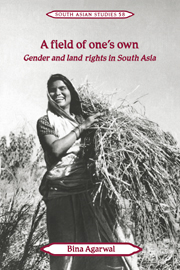Book contents
- Frontmatter
- Contents
- List of illustrations
- List of tables
- Preface
- Map 1.1 South Asia: provincial/state divisions
- 1 Land rights for women: making the case
- 2 Conceptualizing gender relations
- 3 Customary rights and associated practices
- 4 Erosion and disinheritance: traditionally matrilineal and bilateral communities
- 5 Contemporary laws: contestation and content
- 6 Whose share? Who claims? The gap between law and practice
- 7 Whose land? Who commands? The gap between ownership and control
- 8 Tracing cross-regional diversities
- 9 Struggles over resources, struggles over meanings
- 10 The long march ahead
- Definitions
- Glossary
- References
- Index
- Cambridge South Asian Studies
5 - Contemporary laws: contestation and content
Published online by Cambridge University Press: 14 January 2010
- Frontmatter
- Contents
- List of illustrations
- List of tables
- Preface
- Map 1.1 South Asia: provincial/state divisions
- 1 Land rights for women: making the case
- 2 Conceptualizing gender relations
- 3 Customary rights and associated practices
- 4 Erosion and disinheritance: traditionally matrilineal and bilateral communities
- 5 Contemporary laws: contestation and content
- 6 Whose share? Who claims? The gap between law and practice
- 7 Whose land? Who commands? The gap between ownership and control
- 8 Tracing cross-regional diversities
- 9 Struggles over resources, struggles over meanings
- 10 The long march ahead
- Definitions
- Glossary
- References
- Index
- Cambridge South Asian Studies
Summary
[Thousands of sensitive Hindu women … for the first time in their lives left the precious sanctuary of their sheltering homes [during India's freedom struggle]. They came to the battle field and stood beside their brothers and faced jail and lathi charges and often enough, humiliation worse than death. If today … [they] who fought for the independence of India are to be denied their just rights, then our hard-earned freedom is no more than a handful of dust.
(Padmaja Naidu (Congress legislator), Parliamentary debates over the Hindu Code Bill in 1951)May God save us from … having an army of unmarried women.
(M.A. Ayyangar (Congress Legislator) predicting the result of daughters getting property during the Parliamentary debates on the Hindu Code Bill in 1951)The formulation of contemporary inheritance laws on landed property has involved a complex process of interaction between the (colonial and postcolonial) State and different segments of the population, the interplay of varying ideologies and interests, and the conflicting pulls of scriptural rules and local custom. Around the early part of this century, these interactions increasingly took the form of explicit contestation, especially over women's property rights, revealed most prominently (but not only) in the pre- and post-Independence debates surrounding the Hindu Code Bill in India. Large numbers of Indian women participated in an organized campaign to expand women's rights, including property rights. Many Indian men supported the cause; the majority adamantly oppose it.
- Type
- Chapter
- Information
- A Field of One's OwnGender and Land Rights in South Asia, pp. 198 - 248Publisher: Cambridge University PressPrint publication year: 1995

